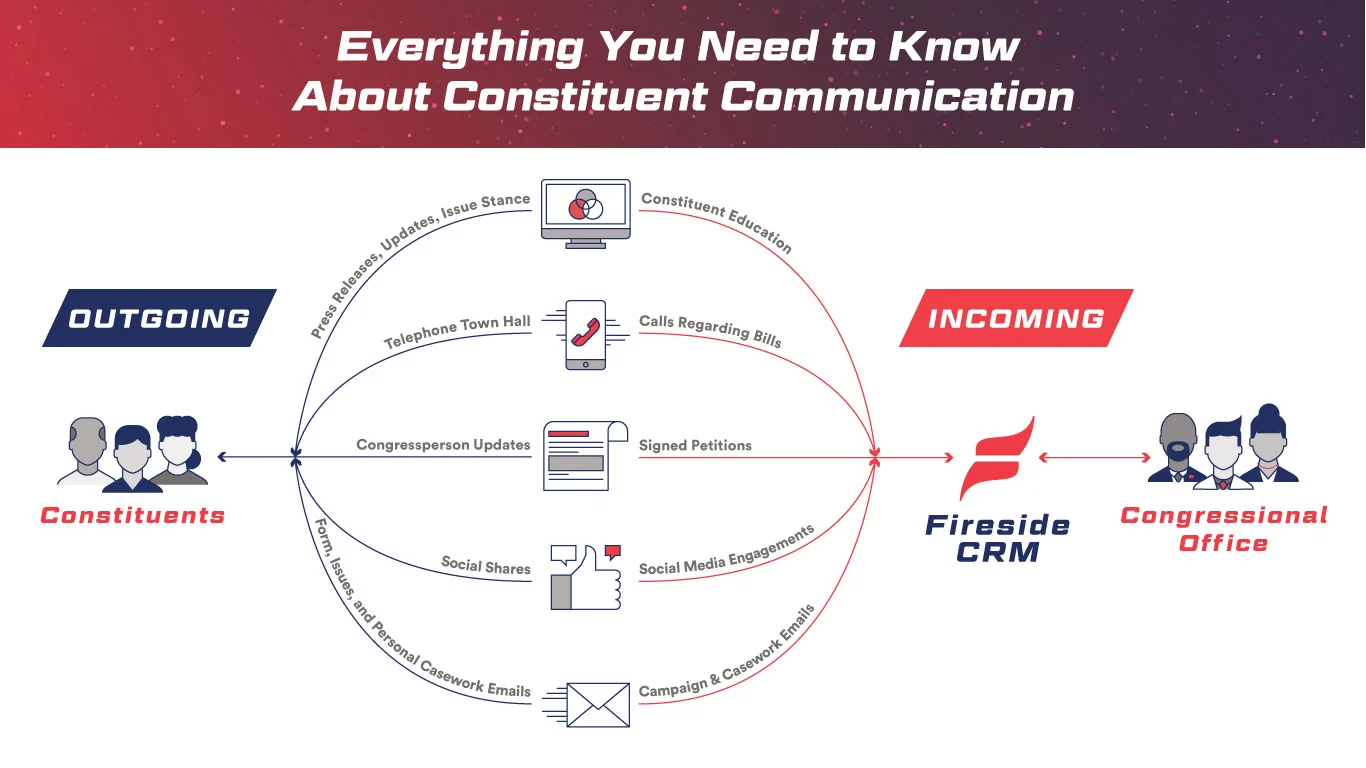It’s time to select your most integral tool, constituent relationship management software. A good CRM will acknowledge that Congress deals primarily in relationships rather than commercial endeavors; efficiency should never come at the expense of thoughtful communication. Fireside’s CRM sets itself apart by putting meaningful correspondence first, while still championing efficiency among House offices.

Mail Turnaround
Incoming Mail: The amount of incoming mail a house office receives per year is rising. Since 2017, Fireside has seen an unprecedented level of civic engagement, so we’ve made it our priority to ensure our software keeps up with usage levels. A properly configured CRM allows staffers quickly and automatically sort mail based on topic and sender.
A robust mailroom should be able to pick out personalized emails from templates using A|B comparison, so your office can give special attention to those responses. Constituents who take the time to craft thoughtful means of communication are valuable to your office, so your CRM needs to ensure that these pieces of mail don’t get lost in the shuffle and ignored.
Sending Replies: If your mail is sorted automatically, good news! You can also set up your CRM to send automatic replies to generic campaign emails. Personal letters should be handled with more care: make sure your office establishes a streamlined chain of approval for specific responses. Fireside’s strategy coaching can help your office get started with processes like these.
Keeping Communication Open
After your constituents contact your office, make sure to keep track of their contact information and interests. They likely will want to hear updates about your work regarding their previously addressed topics.
Your office can send them updates without prior approval from the Franking Committee, thanks in part to our CEO’s testimony to the House Modernization Committee. With a detailed and well-maintained database, your CRM can organize audiences for further communication. Robust records of your constituents help take the guesswork out of communication.
Crafting an Outreach Plan
A thoughtful communication plan can mean the difference between strong district engagement and disconnect between your office and your constituents. A good plan starts with gathering district data, building audiences in your CRM, and choosing your mediums of outreach. Newsletters, telephone town halls, and web surveys are all excellent ways to connect to your constituents and gauge their opinions throughout the year. Frequency of contact, diversity of medium, and consistency are all keys to an effective strategy.
If you’d like a more detailed game plan for building your communication strategy, check out our blog, “Jumpstart Your Congressional Outreach Plan!”
Handling Blackout Dates
Periods with restrictions on mass communications require a different game plan from the regular communication schedule. If you go into blackout without a plan, your office risks missed opportunities to connect with narrow groups of your constituents. Since communications are limited to 499 recipients, you can use your records to narrow your audience to people with specific interests, like veterans from a geographic area or environmental activists who support a carbon tax. You can even gather more data on the things they car about through surveys! Additionally, hosting informative and interactive inbound-only events during blackout is a great way to boost engagement.
If your database is built out with all your office’s communication records and still found lacking, think about purchasing constituent data to further refine your audiences.
Managing Casework
When one of your constituents comes to your office for assistance, you’ll need a proper tool to manage their case. At minimum, a casework tool should have message threading capabilities and a means of managing documents that attend the case.
Casework is integral as our nation adapts to life in the Covid-19 pandemic. People have been turning to their representatives for assistance with loan applications and unemployment aid and offices have stepped in to help. A well-built casework tool ensures that these requests will be tracked along every step of the process and ultimately fill your constituents need.
As former hill staffers, we at Fireside do our best to create a product that works for and with House offices. That’s why our CRM has broad capabilities and takes all the jobs of a staffer into account. Do you want to learn more about Fireside’s CRM? Reach out to a member of our team and schedule a demo today!

